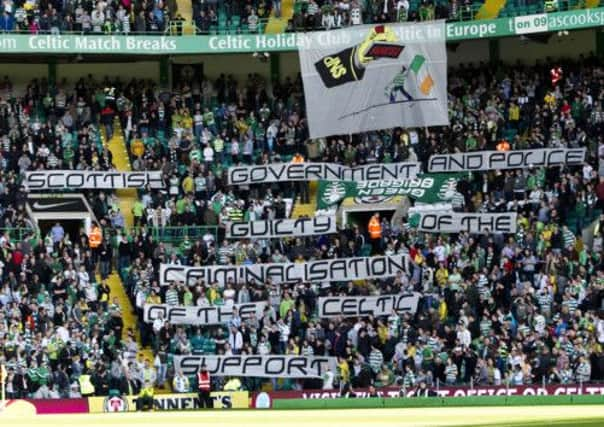Anti-sectarian football laws fear as fans complain


Scotland’s justice authorities have been urged to explain “a perception of intimidation” among supporters, with Celtic fans in particular claiming they have been unfairly targeted.
The Offensive Behaviour at Football and Threatening Communications Act was introduced by the Scottish Government in an effort to end sectarian chanting following high-profile flare-ups involving the Old Firm in 2011.
Advertisement
Hide AdAdvertisement
Hide AdBut fans have complained of having “cameras thrust in their faces” at matches and are confused about what kind of behaviour could land them in trouble, MSPs heard yesterday.
Holyrood’s justice committee has written to the justice secretary, Kenny MacAskill, Police Scotland and the Crown Office calling for a response to e-mail correspondence from fans setting out widespread concerns.
And MSPs made it clear yesterday that they are ready to launch an inquiry into the new laws after receiving the responses.
Independent MSP John Finnie, a former police officer, said yesterday: “There’s a deep sense of feeling and a deep sense of concern about how this is being applied to one group.
For that reason, I am very supportive of an early review of the legislation.”
Stirling University is currently carrying out a two-year academic review of the impact of the new laws.
But the MSP said: “If some young football supporter, to quote from one of the e-mails, is having a camera thrust in their face whilst at a football game, then they’re not interested in the academic aspects of this.”
He added: “It was the perception of intimidation. I don’t think we can ignore it – I think we must act.”
Advertisement
Hide AdAdvertisement
Hide AdThousands of football fans who claimed they were being criminalised by “disproportionate” measures converged on Glasgow’s George Square in April.
The event was organised after an incident which saw Celtic’s self-styled “ultras”, the Green Brigade, clash with police amid claims that they had been unfairly “kettled”.
The controversial practice came to light during the G8 protests and involves the groups targeted effectively being couped up in by a ring of police officers and unable to move.
Concerns also centre on confusion about what does and does not constitute offensive singing.
Conservative back-bencher Margaret Mitchell said the conviction rate for the new laws was 68 per cent compared with 85 per cent for crimes in general, while there’s a dedicated police unit for the new laws. She said: “Clearly, there’s a widespread problem with the act in operation and the various difficulties it is presenting.
“It’s taking up an inordinate amount of resources across the board and there’s even a dedicated unit for it.
“Given the pressures facing police and courts, the time is right to review this act to see exactly what kind of impact it is having.”
Labour’s John Pentland said there was “so much ambiguity” among football supporters and said it was not just Celtic fans who were concerned.
Advertisement
Hide AdAdvertisement
Hide AdHe said: “It doesn’t reflect what’s happening in my constituency – it’s just people going to the local game where there’s this real concern that they don’t know whether they’re doing something right or doing something wrong.”
But Nationalist MSPs played down calls for a separate Holyrood inquiry into the legislation, with QC Rod Campbell urging against “rushing into an inquiry”.
He continued: “As a first step, before we take any view as a committee, we ought to invite comment from the government – we’ve only had one year of statistics.”
The committee will decide in a fortnight whether to establish a Holyrood inquiry into the legislation.